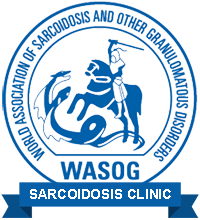Sarcoidosis and Purified Protein Derivative reactivity
Keywords:
Sarcoidosis, Mycobacteria, PPD-reactivity, Interferon Gamma Release Assay, ImmunodiagnosticsAbstract
Background: The possible association between (tuberculous and nontuberculous) mycobacterial infections and sarcoidosis is still a matter of dispute. Using diagnostic tests for specific T-cell responses, this association can be investigated in an innovative manner. Objective: To measure the T-cell responsiveness to the purified protein derivative (PPD) antigen in blood and broncho-alveolar lavage (BAL) fluid in patients with sarcoidosis and patients with other causes of interstitial lung disease. It was hypothesized that if a mycobacterial infection of the lung is of importance for the development of sarcoidosis, T-cell responsiveness towards the PPD antigen would be increased in patients with sarcoidosis when compared to patients with other causes of interstitial lung disease. Methods: A single-center study was conducted which included patients with and without sarcoidosis. Venous blood was collected and BAL was performed for, inter alia, Interferon Gamma Release Assay´s (IGRA) with different stimulating antigens, including PPD, ESAT-6, CFP-10 and, as a control, Epstein-Barr virus (EBV). Results: A total of 118 patients were included. There is no difference between PPD reactivity in BAL fluid in patients with or without sarcoidosis. In patients without sarcoidosis, ELISpot PPD in blood shows more reactivity compared to patients with sarcoidosis, although this difference is not significant. ELISpot EBV and TB results are not significant different between both groups. Conclusion: These results provide no evidence for the involvement of different mycobacteria in the pathogenesis of sarcoidosis.Published
Issue
Section
License
This is an Open Access article distributed under the terms of the Creative Commons Attribution License (https://creativecommons.org/licenses/by-nc/4.0) which permits unrestricted use, distribution, and reproduction in any medium, provided the original work is properly cited.
Transfer of Copyright and Permission to Reproduce Parts of Published Papers.
Authors retain the copyright for their published work. No formal permission will be required to reproduce parts (tables or illustrations) of published papers, provided the source is quoted appropriately and reproduction has no commercial intent. Reproductions with commercial intent will require written permission and payment of royalties.

This work is licensed under a Creative Commons Attribution-NonCommercial 4.0 International License.




